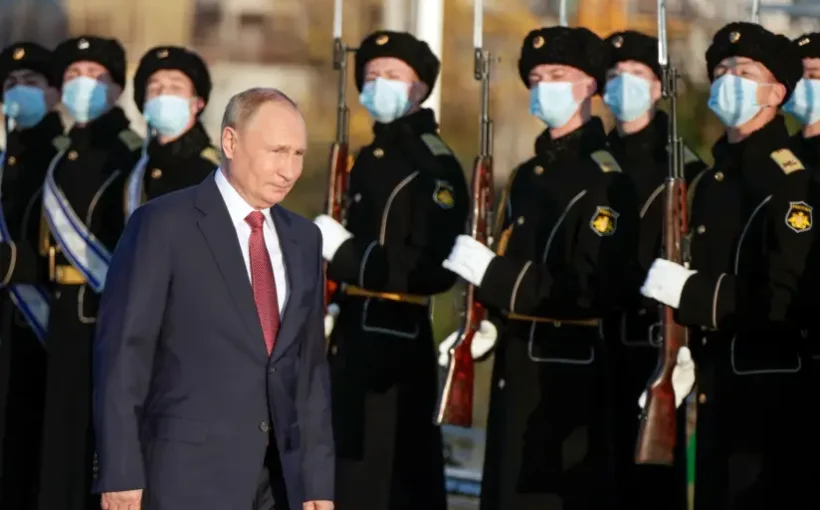Russia shut off the undersea Nord Stream pipeline to Germany for three days starting Wednesday and … gas prices actually fell.
The price of gas on the benchmark Dutch TTF hub was trading at €241.50 per megawatt hour on Wednesday, down from €265.33 on Tuesday and well below Friday’s record peak of €346.52.
It’s a sign that the EU’s effort to diversify supplies, cut back on usage and rapidly fill up gas storage ahead of winter is having an impact on the market. The bloc’s gas storage is above 80 percent, a level that the EU had mandated for November 1.
“Let’s continue filling where the level is still lower & implement the #EU demand reduction plan. This will help us get through winter safely,” tweeted EU Energy Commissioner Kadri Simson.
Germany’s own storage facilities are filled to 83 percent.
“The government prepared for a situation in which gas from Russia no longer flows reliably,” tweeted German Chancellor Olaf Scholz. “That’s why we were able to react quickly and fill the gas storage facilities for the winter.”
Russia is also squeezing other customers. Before the three-day shutdown, Gazprom had limited Nord Stream to a fifth of its normal capacity and has reduced or ended deliveries to a dozen EU countries. It said it would halt deliveries to France’s Engie as of Thursday over a payment dispute.
Even without the full closure of Nord Stream, Russia’s deliveries to the EU are well below last year’s level, when it accounted for 40 percent of the bloc’s gas supply. Last week, Russia sent 856 million cubic meters to the EU, 68 percent lower than in the same period in 2021, according to the Breugel think tank.
“Russia is using gas as a weapon of war,” French Energy Transition Minister Agnès Pannier-Runacher said on Tuesday.
Politics is playing a big role in who gets the gas. Hungary, one of the Kremlin’s few defenders in the EU, on Wednesday announced a new deal to buy more Russian gas.
“Hungary’s energy supply is safe,” said government spokesperson Zoltán Kovács.
Worries remain
The lack of a panicked market reaction to Russia shutting down Nord Stream for maintenance — a claim that Western European politicians disputed — doesn’t mean that the Kremlin cutting off deliveries will have no consequences.
“The situation is tense and a further worsening of the situation cannot be ruled out. The gas supply in Germany is, however, currently stable,” said the Bundesnetzagentur, Germany’s grid regulator.
Even at Wednesday’s slightly lower levels, gas prices are still about 10 times higher than a year ago. That is feeding through to electricity prices thanks to the EU’s power market design, where the final input needed to balance demand — usually gas — sets the price for the whole market.
“Wholesale prices have risen sharply recently and continue to be at very high levels,” warned the Bundesnetzagentur. “Companies and private consumers must expect a considerable increase in gas prices.”
EU energy ministers will meet on September 9 to discuss the situation, and are expected to look at short-term measures to rein in prices as well as a longer-term revamp of the bloc’s energy market structure.
The German government is preparing for a lot of pain this winter, something Economy and Climate Minister Robert Habeck made clear on Wednesday. Measures will be taken to “prevent prices from going through the roof,” he said after a German Cabinet meeting.
The Cabinet discussed what pro-business Finance Minister Christian Lindner called a “massive package” to relieve pressure on consumers and businesses — the third such initiative from Berlin. Habeck warned that companies were stopping production or shutting down because of high energy prices.
Despite the market pullback, Gazprom CEO Alexey Miller on Wednesday insisted that gas prices would be even higher this winter “if current market trends persist.”
If Russia pulls the trigger on its gas weapon and ends deliveries over the longer term, getting through the winter season will depend on the amount of gas in storage, deliveries of liquefied natural gas from suppliers like the United States, and cutting back on demand; Germany pledged to cut demand by 15 percent, and is on track to do so, although other big markets like Italy aren’t close to that level.
“The soaring cost of energy seems to have caused consumers to save gas. Large businesses are making especially severe cuts,” the International Monetary Fund wrote in a recent assessment of the situation in Germany.
Finally, surviving the coming months without a catastrophe is also going to need some luck — that the winter isn’t much colder than usual.
EU progress on filling reserves “will probably be sufficient to muddle through the winter, but it’s not going to be smooth and the prices will remain very high,” said Alexander Gabuev, a senior fellow at the Carnegie Endowment for International Peace.
Source: Politico


